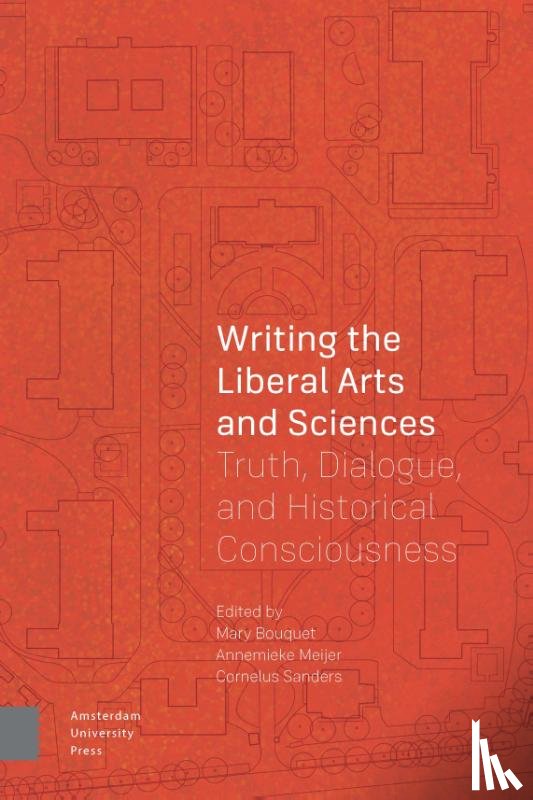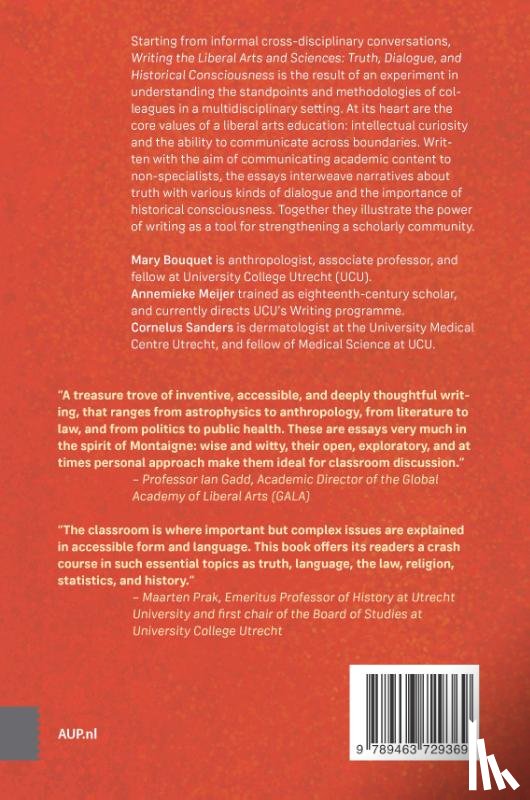Omschrijving
Starting from informal cross-disciplinary conversations between colleagues, this volume is the result of an experiment in understanding the standpoints and methodologies of others in a multidisciplinary setting. At its heart are the core values of a liberal arts education: intellectual curiosity and the ability to communicate across borders. Written with the aim of communicating academic content to non-specialists, the essays interweave narratives about truth with various kinds of dialogue and the importance of historical consciousness. Together they illustrate the power of writing as a tool for strengthening a scholarly community.
“A treasure trove of inventive, accessible, and deeply thoughtful writing, that ranges from astrophysics to anthropology, from literature to law, and from politics to public health. These are essays very much in the spirit of Montaigne: wise and witty, their open, exploratory, and at times personal approach make them ideal for classroom discussion. They offer us opportunity and space for valuable reflection and learning, and remind us that the liberal arts and sciences must be at the heart of debates about the human condition and the world’s most important and pressing concerns.” - Professor Ian Gadd, Academic Director of the Global Academy of Liberal Arts (GALA)
“The classroom is where important but complex issues are explained in accessible form and language. This book offers its readers a crash course in such essential topics as truth, language, the law, religion, statistics, and history, but you don’t have to stick to a school timetable and there is no exam afterwards. It’s a feast for the mind; enjoy!” - Maarten Prak, Emeritus Professor of History at Utrecht University and first chair of the Board of Studies at University College Utrecht Mary Bouquet is anthropologist, associate professor, and fellow at Utrecht University College.
Annemieke Meijer was trained as an eighteenth-century scholar and is currently the director of UCU’s Writing programme.
Cornelus Sanders is a dermatologist at the University Medical Centre Utrecht and the fellow of Medical Science at University College Utrecht.
Table of Contents
Acknowledgements
Introduction: Writing the Liberal Arts and Sciences
Mary Bouquet, Annemieke Meijer and Cornelus Sanders
I Truth
The indispensable Truth : Postmodernism and the possibility to understand each other
Floris van der Burg
Fictionality, or the importance of being earnest
Agnes Andeweg
And Justice for All
Alexis A. Aronowitz
Handling tricky questions
Jocelyn Ballantyne
What is Meaning?
Gaetano Fiorin
II Dialogue
Parmenides and Dōgen – an encounter
Chiara Robbiano
On being a doctor
Cornelus Sanders
Law, imagination, and poetry
Bald de Vries
Religion 2.0: Thinking about religion through technology
Katja Rakow
Global mental health and the evolution of clinical psychology
Robert Dunn
Heroes of the in-between
Rozi Tóth and Gerard van der Ree
III Historical Consciousness
What history’s most overqualified calculus student tells us about liberal arts mathematics
Viktor Blåsjö
Statistics: The art of seeking sense in numbers
Guus de Krom
The canon of the Netherlands revisited
James Kennedy
Love thyself: An abridged history of Western portraiture
Tijana Žakula
Two Monuments
Mary Bouquet
The challenge of living on renewable energy
Anton E.M. van de Ven
The earth as an observatory: Team work in science
Filipe Freire
The First Assignment
Markha Valenta
List of contributors
List of figures
Notes
Index of names




